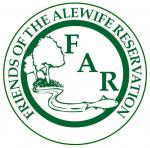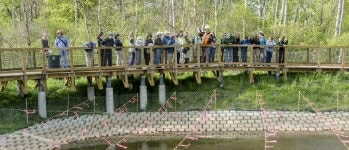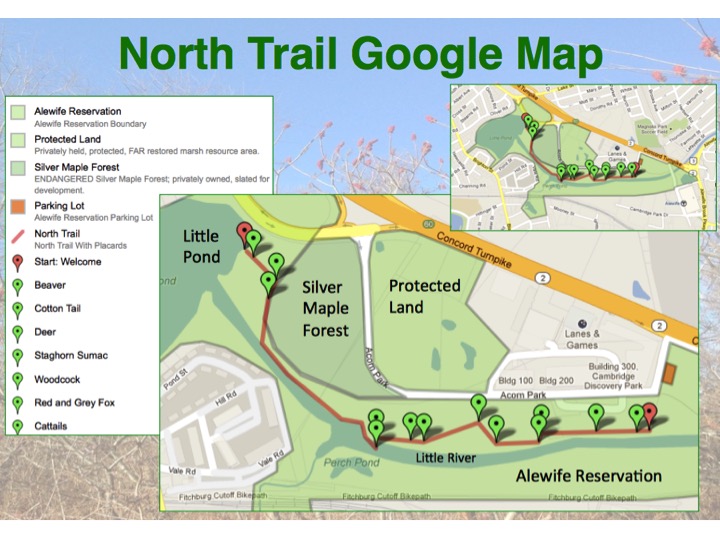
Friends of Alewife Reservation has advocated for years for the protection of the Alewife floodplain and urban wild, especially as the water quality at Little River has continued to fail to meet Federal Standards. We hoped that greater protections would be forthcoming since the City Manager’s office and Community Development Agency recently created climate change and Alewife committees, but sadly, that is not the case. This is in spite of the fact that the Alewife T area is 5 feet above sea level and, according to the city, highly vulnerable to sea rise and surge events. In spite of the threats posted by climate change, the Alewife Committee’s concerns are largely about traffic, and their solution for flooding is raising buildings above the 'surge' or 'sea rise' level via higher construction and underneath flood storage. National storm water regulatory requirements or the original city Vulnerability Assessment study at Alewife conducted by Kleinfelder Inc. now seem an insignificant part of the watershed conversation. Not only that, but Federal Army Corps of Engineers maps are characterized as an exaggeration of climate change and FEMA floodplain maps are dismissed as 'faulty,' with emphasis placed solely on Insurance and costs. Indeed, it appears that our corporate neighbors are waiting until advocacy efforts burn out and construction begins on thousands of residential units near Rt. 2 and the Quadrangle. Also concerning are mitigation for a City dump site and massive development that will likely follow in the floodplain across from Fresh Pond once a city-proposed medicinal marijuana dispensary at Alewife quadrangle is built. With an anti-EPA administration and climate deniers in the White House, progress may be halted. However, broad environmental alliances continue strong. At the Mass Rivers Alliance annual meeting on Wednesday December 14, representative watershed groups (including FAR) re-affirmed the environmental values of the US Clean Water Act, Clean Air Act and Rivers and Wetlands Protection Acts. We agreed to advocate at the state level with the Environmental League of Massachusetts for better storm water enforcement, and general watershed protections. However, news is bad federally and locally for these state, federal and municipal environmental regulations, which means unhealthy rivers and streams will persist without organized grassroots involvement. On the ludicrous side, instead of denying permits to polluting developers, permitting agencies have asked FAR to remove access to our urban wild and dismantle our wildlife signs (installed by students from Lesley University), remove bridges, and let nature take over the North trail. To add insult to injury, a Conservation Restriction pathway (given to DCR) from the new 300 unit Royale residents building (formerly the Silver Maple forest) will be constructed through sensitive habitat. This is happening because FAR's recently passed City Council - wide Alewife pathway policy order, which was intended to block any further development of paths for access to the T stop (sponsored by Craig Kelley and Jan Deveraux), has instead been interpreted by the Commission to also stop passage of ecology learners and birders along the much loved one mile biodiversity trail (formerly a Powtuckeog Indian fishing trail). This trail has been maintained by large community service groups for 10 years and was used for environmental education by the Belmont, Arlington and Cambridge communities. It appears the city has reacted against environmental advocates who feel that Wetland Protection Act (WPA) protections should have been enforced on behalf of the Reservation's urban wild years ago, before the Silver Maple forest was clear cut for a Pennsylvania developer in Belmont and Cambridge. In a further development, the hearing for the 2-year FAR Ecology Campers ‘River Restore’ project has now been postponed until Spring, after bridges and signs are removed or destroyed. On December 12 we also received a "continuance" (delay) of the Hearing from the Commission with Notice of Intent (NOI) for Perch Pond embankment work, which the Commission gave the green light to proceed to Hearing status in September, but is now postponed for 5 months. Bridge-free access options to reach Perch Pond, the model River Restore project, have been found and mapped for the Commission. The model project is intended to show that habitat for birds, insects and animals can be improved using standard restoration techniques along the river's 6 study sections. These sections were studied by Eco-campers over 2 summers as well as by 2 wetland specialists, who prepared a formal report given to the city, state and many local groups. All this work has shown that Little River in Cambridge and Little Pond in Belmont continue to fail water quality tests due to high toxic bacteria counts that flow to the Boston Harbor, via Mystic River, and would penetrate homes and businesses under high water conditions. The city Alewife committees must take this data seriously and make safety and health foremost considerations in civic affairs. We trudge forward with positive offerings always and a sense of sacred purpose that something will change. The earth is holy but is failing and all are called to protect it, even at Alewife. Ellen Mass President Friends of Alewife Reservation
- Home
- Directions
- FAR Wildlife Blog
- Calendar
- News
- Donate Now
- Get Social!
- Storm Water Wetlands
- Plants and Restoration
- Photos
- Videos
- About & Projects
- Master Plan for Alewife
- Archive
- Newsletters
- Contact
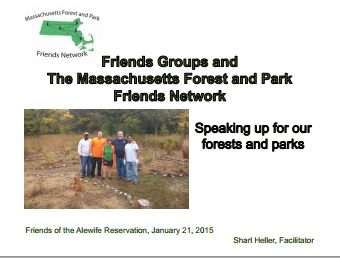 Presentation Spotlighting Alewife Reservation
Presentation Spotlighting Alewife Reservation
 Follow us on Twitter
Follow us on Twitter
 Like us on Facebook
Like us on Facebook
 Follow us on Instagram
Follow us on Instagram
Forward our web address to a friend!
- An Urban Gem - Alewife Reservation Nature Preserve
- Envisioning The Silver Maple Forest
- History and Policies of Cambridge, Belmont, and DEP
- Storm Water Wetlands
- Friends of Alewife Reservation brochure
(front, back) - Technical Analysis of Upper Alewife Basin
- Watershed: An Excursion in Four Parts
- The River Is A Restless Spirit: Life in the floodplain forest
-
Assessment of Silver Maple forest for DEP Adjudicatory hearings and
Patrick Fairbairn, author of the Assessment - Community Native Garden Flora
The
Alewife Reservation
is a unique natural resource for the communities of Belmont, Arlington and Cambridge
and home to hundreds of species, including hawks, coyotes beavers, snapping turtles, wild turkeys and muskrats,
the reservation is a unique natural resource for the community.
Historical information (Powerpoint)
Friends of Alewife Reservation works to protect and restore this wild area and the surrounding area for the water quality, native plants, animals and over 90 bird species with paths for walking, running and biking, recreation, and for classroom education and research. We regularly steward and preserve the Reservation area for wildlife and for the enjoyment of present and future generations.
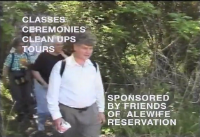
(video)
By-Laws
About Friends of Alewife Reservation
Statement of Purpose
Citizen Forester newsletter archive
The Birds of the Cambridge Region of Massachusetts

by William Brewster 1906
Nuttal Ornithological Society
Biodiversity Study of Alewife Reservation Area: Species, Habitat, Ecosystems

Inventories by David Brown, wildlife assessor (2003, 2004.) Published by and available from FAR for $10. Write or call for your copy. (sample)
Updated Dave Brown Inventories (2008, 2010)
Inventories of Alewife Reservation Wetland Plants by Walter Kittredge, Botanist (2013)
Email: alewife@greencambridge.org
Join our mailing list
For technical problems with this website, email: webmaster@friendsofalewifereservation.org
